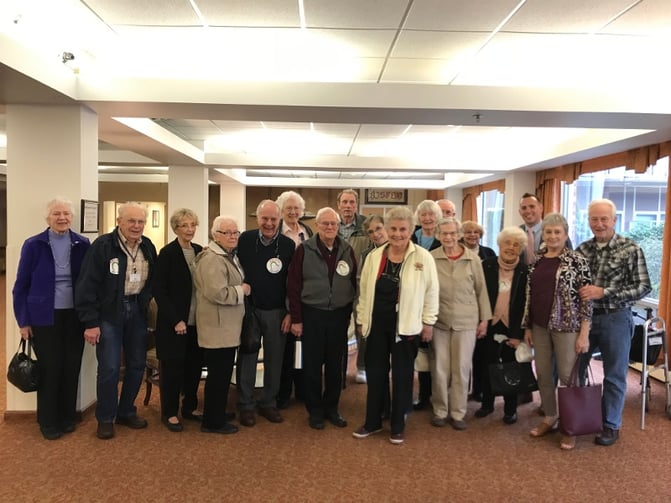
In early 2019, residents joined forces to raise awareness about a state measure that would have had a negative impact on Judson Park and their fellow neighbors. The state measure, which was requested by the Washington Association of Continuing Care Residents (WaCCR), would require senior living organizations to meet certain reporting requirements that could have increased expenses for Judson Park and thus for our residents.
Led by residents Jim Patrick and Trudy Thompson, residents did everything to halt the bill. That included testifying before the Washington state legislature, meeting with state representatives and petitioning representatives in personal emails and letters sharing their concerns. Those efforts led the state Senate to return the bill to the House Rules Committee, where it eventually died.
“Trudy and I have fought for or against other legislative issues in the past, but this one has been especially intense and fast moving,” said Jim, who chairs the community’s resident-led Advocacy committee. “The gratifying thing, especially this time, has been the willingness of so many of our residents to get involved and help in so many ways.”
Jim and Trudy, who is the current president of the community’s Resident Council, shared their experience in the following interview. Check it out below:
Q: Can you share a little about the bill and its impact on Judson Park?
Jim: The WaCCRA represents only about 700 residents of the 8000 residents living in continuing care retirement communities in our state, and they live in a few larger and more expensive communities in downtown Seattle with entrance fees of up to $2 million with type A contracts.
As an association, they appear to be mainly concerned with their communities’ financial stability and ability to pay for their lifetime care, especially if they move to a higher level of care. To get that assurance, the bill required CCRCs with type A contracts to do an actuarial report at least every three years and disclose that report to their residents or prospective residents. Also, senior living communities that have already completed an actuarial study would be required to release their report to residents or prospective residents. So, if Judson Park did an actuarial study, it would cost over $10,000 to be able to publicly release it, as the outside firm conducting the study will be concerned about the risk they would face if anyone misused or misunderstood the information in the report.
The bill also requires all CCRCs that are part of an affiliated group or that purchased management services from an outside company to track, record and report in detail all payments to the management or parent company. Not just the total spent on services like marketing, IT and human resources, but also the portion of the fees that were funded from residents’ monthly entrance fees. The bill also requires that any management fees paid must be at or below fair market value. For Judson Park (and HumanGood), that would add a new expense on the community and the organization to track, record and report such information to residents. WaCCRA sought this accounting detail because they suspect that portions of the management fees paid are being used to support activities in other commonly-owned CCRCs. The cost of these two new requirements would likely result in increased monthly fees for residents, not only at Judson Park, but for a considerable number of other senior living communities in Washington state.
The bill also would have allowed each resident the opportunity “to participate in significant decisions affecting the resident's health, welfare, and financial security.” And, management decision-making authority is restricted to the four corners of the residency agreement and applicable laws. Obviously, all CCRCs are concerned that this language could result in chaos and drive up legal costs if just one resident had an issue with any management decision on any issue.
Q: The bill appears to be dead for now. What does that mean for both of you, the advocacy committee members and your fellow Judson Park neighbors to have such an impact?
Jim: We both truly had hoped that our efforts would have an impact by either defeating the bill or causing major changes that resolve all of our concerns as outlined above. Our residents here will be protected from monthly fee increases that many cannot afford.
Trudy: It would also mean to our residents that their efforts in calling the legislative hotline, emailing legislators, attending legislative town halls nearby, signing our letters to legislators, and traveling 60 miles to the state capitol with us while we testify, has all been worthwhile.
Q: What have you discovered about yourselves and your fellow neighbors during this advocacy fight?
Jim: Trudy and I have fought for or against other legislative issues in the past, but this one has been especially intense and fast moving. The gratifying thing, especially this time, has been the willingness of so many of our residents to get involved and help in so many ways.
Trudy: I do have to say that all my life there were two things I never wanted to do in my life. One was to be involved in raising money and the second was to get into politics. Since living at Judson Park, I have found myself heavily invested in both. I was chair of the Foundation committee for five years, and I am still a member of the committee. I started our resident Advocacy committee four years ago to advocate for our residents when I learn of legislation affecting CCRCs through my connection with LeadingAge Washington. Man plans and God has his own way of carrying it out.
Jim: We’d also like to recognize the outstanding efforts of the LeadingAge Washington staff and Executive Director Deb Murphy.


.png?width=260&height=56&name=new-hg-logo-rev-with-registered-mark%20(2).png)